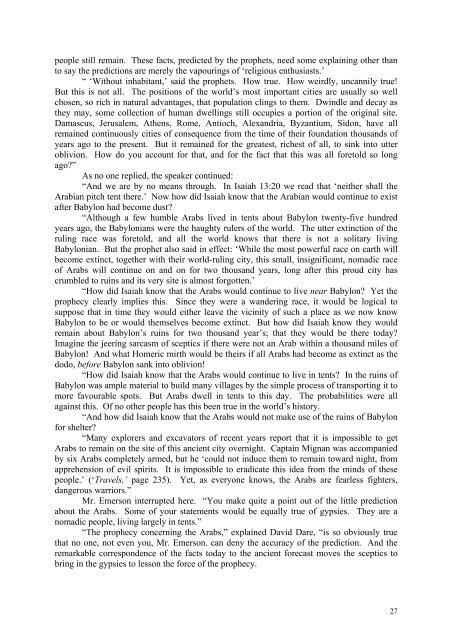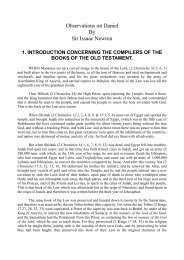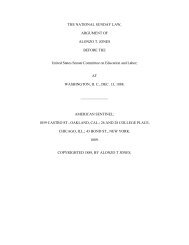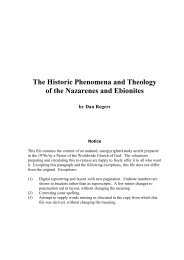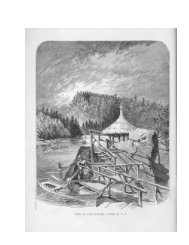Prophecy Speaks (E.A.Rowell).pdf
Prophecy Speaks (E.A.Rowell).pdf
Prophecy Speaks (E.A.Rowell).pdf
Create successful ePaper yourself
Turn your PDF publications into a flip-book with our unique Google optimized e-Paper software.
people still remain. These facts, predicted by the prophets, need some explaining other than<br />
to say the predictions are merely the vapourings of ‘religious enthusiasts.’<br />
“ ‘Without inhabitant,’ said the prophets. How true. How weirdly, uncannily true!<br />
But this is not all. The positions of the world’s most important cities are usually so well<br />
chosen, so rich in natural advantages, that population clings to them. Dwindle and decay as<br />
they may, some collection of human dwellings still occupies a portion of the original site.<br />
Damascus, Jerusalem, Athens, Rome, Antioch, Alexandria, Byzantium, Sidon, have all<br />
remained continuously cities of consequence from the time of their foundation thousands of<br />
years ago to the present. But it remained for the greatest, richest of all, to sink into utter<br />
oblivion. How do you account for that, and for the fact that this was all foretold so long<br />
ago?”<br />
As no one replied, the speaker continued:<br />
“And we are by no means through. In Isaiah 13:20 we read that ‘neither shall the<br />
Arabian pitch tent there.’ Now how did Isaiah know that the Arabian would continue to exist<br />
after Babylon had become dust?<br />
“Although a few humble Arabs lived in tents about Babylon twenty-five hundred<br />
years ago, the Babylonians were the haughty rulers of the world. The utter extinction of the<br />
ruling race was foretold, and all the world knows that there is not a solitary living<br />
Babylonian. But the prophet also said in effect: ‘While the most powerful race on earth will<br />
become extinct, together with their world-ruling city, this small, insignificant, nomadic race<br />
of Arabs will continue on and on for two thousand years, long after this proud city has<br />
crumbled to ruins and its very site is almost forgotten.’<br />
“How did Isaiah know that the Arabs would continue to live near Babylon? Yet the<br />
prophecy clearly implies this. Since they were a wandering race, it would be logical to<br />
suppose that in time they would either leave the vicinity of such a place as we now know<br />
Babylon to be or would themselves become extinct. But how did Isaiah know they would<br />
remain about Babylon’s ruins for two thousand year’s; that they would be there today?<br />
Imagine the jeering sarcasm of sceptics if there were not an Arab within a thousand miles of<br />
Babylon! And what Homeric mirth would be theirs if all Arabs had become as extinct as the<br />
dodo, before Babylon sank into oblivion!<br />
“How did Isaiah know that the Arabs would continue to live in tents? In the ruins of<br />
Babylon was ample material to build many villages by the simple process of transporting it to<br />
more favourable spots. But Arabs dwell in tents to this day. The probabilities were all<br />
against this. Of no other people has this been true in the world’s history.<br />
“And how did Isaiah know that the Arabs would not make use of the ruins of Babylon<br />
for shelter?<br />
“Many explorers and excavators of recent years report that it is impossible to get<br />
Arabs to remain on the site of this ancient city overnight. Captain Mignan was accompanied<br />
by six Arabs completely armed, but he ‘could not induce them to remain toward night, from<br />
apprehension of evil spirits. It is impossible to eradicate this idea from the minds of these<br />
people.’ (‘Travels,’ page 235). Yet, as everyone knows, the Arabs are fearless fighters,<br />
dangerous warriors.”<br />
Mr. Emerson interrupted here. “You make quite a point out of the little prediction<br />
about the Arabs. Some of your statements would be equally true of gypsies. They are a<br />
nomadic people, living largely in tents.”<br />
“The prophecy concerning the Arabs,” explained David Dare, “is so obviously true<br />
that no one, not even you, Mr. Emerson. can deny the accuracy of the prediction. And the<br />
remarkable correspondence of the facts today to the ancient forecast moves the sceptics to<br />
bring in the gypsies to lesson the force of the prophecy.<br />
27


